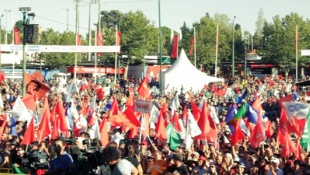Among us, for several days, was the Dalai Lama. He explained that his visit «is not political, but spiritual and to teach. Sometimes I have a political agenda – in Brussels or in Washington – but I came here only with my smile» (Público, 13.09.07). But as during his previous visit, in 2001, the Buddhist leader benefited from a vast and privileged coverage by the media. In fact, what his visit offered, other than the mystical cultured ambiance and the song and dance around the defence of «human rights», «non-violence» and «spirituality», was once again the sublime opportunity to reignite the tired «cause of Tibet» and feed the anti-China campaign, as it is outlined internationally from the major decision centres. This opportunity was used to the limit by the Portuguese media and a broad political class, from the right-wing to the «multiple-cause» light Left, to let loose their «single cause», using lies, disinformation and outright political opportunism and dishonesty.
We should recall, this time when double standards and subversion of international law are the norm, that Tibet is an autonomous region within China, and has been a part of China for 700 years. That was already the case in the travel stories of Marco Polo and it was the case when Sun Yat-sen proclaimed the Republic, in 1912. Actually, never, since the XIIIth century, has any state in the world recognized Tibet as an independent state. In line with the failed British invasions of 1888 and 1903 and the subsequent support of imperialist powers to the separatist movement stimulated among the lamas and Tibetan nobles, the separatist movement and the Tibet question has been used to strike blows against the Chinese Revolution and hinder the reunification of the country. As when the Tibetan reaction founded, with the support of the CIA, the “National Volunteer Defence Army”, leading to the war of 1959-1961. A civil war, that opposed the classes committed to preserving the reigning brutal, theocratic, and feudal regime, supported by imperialism interested in the division of China, against the forces of the popular government and the monks, nobles, slaves and serfs committed towards unity with China and democratic reform in Tibet. Few of those at the Atlantic Pavilion listening to the Dalai Lama would know that in 1959 the high caste lamas, the secular nobles, and their agents represented only 5% of the population of Tibet, while serfs and slaves corresponded to 95% of the population. Naturally today the Dalai Lama brushes the shades of the past aside, denying the return to the old Tibet, and stating that he does not want – to the disquiet of his most unconditional followers – the independence of Tibet.
But let there be no illusions. The old umbilical cord that ties him to imperialism is solid. The mellifluous political agenda of the Dalai Lama will continue shortly. For now, in Germany, where he will meet Merkel on the 23rd. Surely in defence of “respect for the rules of international affairs”. And the policy of restraining China, in its multiple changing forms, from the US selling arms to Taiwan to the manipulation of environmental concerns. Because while today China’s market offers big capital irrefusable surplus-value, the truth is that China asserting its sovereignty and claiming a role in the world is a scary prospect.

